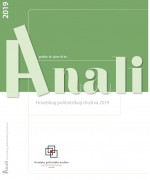Kritički građani ili nezadovoljni autokrati? Potpora demokraciji u Hrvatskoj 1999-2018.
Critical Citizens or Dissatisfied Autocrats? Support for Democracy in Croatia between 1999 and 2018
Author(s): Goran Čular, Berto ŠalajSubject(s): Political history, Government/Political systems, Electoral systems, Political behavior, Politics and society, Transformation Period (1990 - 2010), Present Times (2010 - today)
Published by: Hrvatsko politološko društvo
Keywords: support for democracy; critical democrats; dissatisfied autocrats; voting behaviour; Croatia;
Summary/Abstract: Have the attitudes of citizens on democracy changed under increased institutional instability and party system changes in Croatia in recent years? In an attempt to answer that question, the authors start with the concept of support for democracy as originally conceived by David Easton, and later further elaborated on by Russel Dalton and Pippa Norris. This article provides an analysis of the relationship between diffuse and specific support for democracy in Croatia between 1999 and 2018 and its impact on voting behaviour including casting a ballot for the established parties (loyalty), for the new and protest parties (vote) or abstention (exit). The analysis involves seven time points in electoral survey research between 1999 and 2018 in Croatia and is complementary to other research on support for democracy in the country. The results confirm that the gap between normative support and the satisfaction with how democracy works increases over time, which is also evident from the increase in the number of critical (dissatisfied) democrats, but also of dissatisfied autocrats. Although both groups are still rather evenly represented among the established and the new political parties, there are indications that the dissatisfied autocrats will more often than not opt for the vote rather than the exit. At the same time, the overall picture of the post-2015 internal structure of democratic support increasingly resembles the pre-2000 era, when major institutional changes took place, giving an added dimension to the political changes of 2015 and 2016 and sparking the question of the future impact that new political actors will have on the support for democracy.
Journal: Anali hrvatskog politološkog društva
- Issue Year: 2019
- Issue No: 16
- Page Range: 7-26
- Page Count: 20
- Language: Croatian

